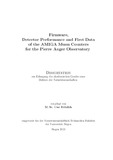Citation link:
https://nbn-resolving.org/urn:nbn:de:hbz:467-7737Files in This Item:
| File | Description | Size | Format | |
|---|---|---|---|---|
| froehlich_uwe.pdf | 20.42 MB | Adobe PDF |  View/Open |
| Dokument Type: | Doctoral Thesis | metadata.dc.title: | Firmware, detector performance and first data of the AMIGA muon counters for the Pierre Auger Observatory Firmware, Detektor-Performance und erste Daten der AMIGA-Myonzähler für das Pierre-Auger-Observatorium |
Authors: | Fröhlich, Uwe | Institute: | Fakultät IV - Naturwissenschaftlich-Technische Fakultät | Free keywords: | Myondetektor, Astroteilchenphysik, muon detector, astroparticle physics, AMIGA | Dewey Decimal Classification: | 530 Physik | GHBS-Clases: | UHXP VEBD VEBK |
Issue Date: | 2013 | Publish Date: | 2013 | Abstract: | With the Pierre Auger Observatory, being the largest air shower detector setup in the world, ultra-high-energy cosmic rays are studied with full trigger efficiency above E = 3E18 eV. In order to achieve a more detailed understanding of cosmic ray physics at lower energies down to E ≈ 1E17 eV, e.g. the transition from galactic to extragalactic sources and a possible change in the composition of the primary cosmic rays, the observatory is currently upgraded by the AMIGA enhancement (Auger Muons and Infill for the Ground Array). The muon counters of AMIGA, buried underground, will allow for dedicated measurements of the number of muons in air showers, thus increasing the precision in determining the type of the primary particle. Until middle of 2012, eight prototype muon counters of the AMIGA enhancement were installed at the experimental site of the Pierre Auger Observatory at Malargüe, Argentina, forming one detector hexagon referred to as the pre-unitary cell (PUC). Each muon counter comprises a highly modular electronics readout system. Following the production of these systems, tests of single components as well as of the full readout electronics were carried out. In the framework of this thesis dedicated firmware, allowing for the commissioning and first data taking with the PUC, has been developed and tested. Among other features, this firmware includes a self-trigger of the muon counters as well as algorithms for the synchronization of the muon detector (MD) with the existing surface detector (SD) array. The functionality and performance of the electronics readout system with regard to this firmware has been investigated. In addition, first analyses of combined MD and SD data have been performed. Mit dem Pierre Auger Observatorium, dem weltweit großten Luftschauer-Experiment, wird ultrahochenergetische kosmische Strahlung mit voller Triggereffizienz oberhalb von E = 3E18 eV untersucht. Um ein detaillierteres Verständnis der Astroteilchenphysik bei niedrigeren Energien bis E ≈ 1E17 eV zu erlangen, z.B. vom Übergang von galaktischen zu extragalaktischen Quellen und einer moglichen Änderung in der Zusammensetzung der primären kosmischen Strahlung, wird das Observatorium gegenwärtig durch die AMIGA-Erweiterung (Auger Muons and Infill for the Ground Array) weiter ausgebaut. Die unterirdisch installierten AMIGA-Myonzähler erlauben eine dedizierte Messung der Anzahl der Myonen in Luftschauern und erhohen somit die Präzision der Bestimmung des primären Teilchens. Bis Mitte des Jahres 2012 wurden acht Prototypen der Myonzähler der AMIGA-Erweiterung am Standort des Pierre Auger Observatoriums bei Malargüe, Argentinien, installiert. Diese sind in einem ersten Hexagon angeordnet, welches als ”pre-unitary cell“ (PUC) bezeichnet wird. Jeder Myonzähler beinhaltet ein hochmodulares, elektronisches Auslesesystem. Nach der Produktion dieser Systeme wurden Tests der einzelnen Komponenten sowie der gesamten Ausleseelektronik durchgeführt. Im Rahmen der vorliegenden Arbeit wurde Firmware entwickelt und getestet, welche die Inbetriebnahme der PUC sowie erste Datennahmen ermoglicht. Neben anderen Funktionen beinhaltet diese Firmware einen Selbst-Trigger der Myonzähler sowie Algorithmen zur Synchronisation des Myondetektors (MD) mit dem bestehenden Oberflächen-Detektor-Feld (SD). Die Funktionalität und das Betriebsverhalten der elektronischen Auslesesysteme wurde hinsichtlich dieser Firmware untersucht. Zusätzlich wurden erste Analysen von kombinierten MD- und SD-Daten durchgeführt. |
URN: | urn:nbn:de:hbz:467-7737 | URI: | https://dspace.ub.uni-siegen.de/handle/ubsi/773 | License: | https://dspace.ub.uni-siegen.de/static/license.txt |
| Appears in Collections: | Hochschulschriften |
This item is protected by original copyright |
Page view(s)
462
checked on Dec 26, 2024
Download(s)
146
checked on Dec 26, 2024
Google ScholarTM
Check
Items in DSpace are protected by copyright, with all rights reserved, unless otherwise indicated.

